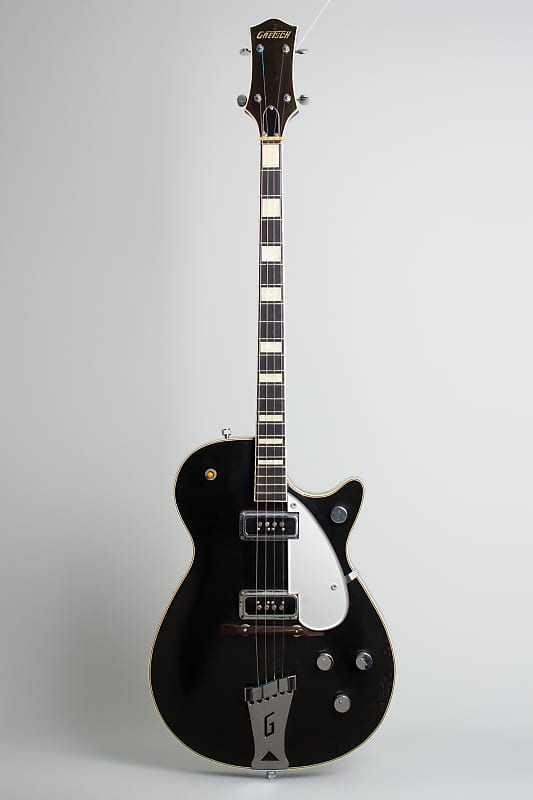Gretsch PX 6127 Duo-Jet Plectrum Model Solid Body Electric Guitar (1955), made in Brooklyn, NY, serial # 16646, black lacquer finish, mahogany body and neck, ebony fingerboard, original tweed hard shell case.
There’s rare, and then there’s RARE, and then there’s one-of-a-kind. This Gretsch Duo-Jet custom built as a 4-string Plectrum guitar is quite likely the only one of its kind ever made; if an exact duplicate instrument has ever appeared, it is not known in the Gretsch community.
The Duo-Jet was a relatively new model in 1955, and for the first couple of years was also offered as a short-neck 4-string tenor guitar as a price list line item. These are very rare — the electric tenor never really caught on — but a small number are known to exist. It is probable a player in the plectrum style saw this model and ordered one in their preferred long-neck tuning. This guitar is part of a 50-unit Duo-Jet batch made in early 1955; it is also unusual in having an all-black finish, where most Duo-Jets have a black top and a natural mahogany back and sides.
Except for its long 26″ scale length, this guitar is basically the same as its tenor sisters. The slim extended neck has a rosewood fingerboard with pearloid block inlay, an adjustable truss rod and Waverly openback tuners. The pickups are specially built 4-pole DeArmond Dynasonics, as seen on some tenor guitars of the period (many simply used the standard 6-pole variant as well). The bridge is an adjustable wooden piece, as the Melita bridge used on period Duo-Jets was not made in a 4-string configuration. All other hardware is standard for the period Duo-Jet including a 6-string Chrome “G” cutout tailpiece, “arrow” chrome knobs, openback Waverly tuners and new-for-1955 silver Lucite pickguard.
The guitar plays and sounds excellent and works well in the original plectrum tuning (C G B D), regular guitar tuning (minus the low A and E), and open G 5-string banjo tuning. This super rare and collectible Gretsch is equally suitable for the museum or the stage; one of those head-turning oddballs from our local 1950s Brooklyn boys.
Overall length is 41 3/8 in. (105.1 cm.), 13 1/2 in. (34.3 cm.) wide at lower bout, and 2 in. (5.1 cm.) in depth, measured at side of rim. Scale length is 26 in. (660 mm.). Width of nut is 1 1/4 in. (32 mm.).
This is a nice, clean, and original guitar with some light signs of playwear but no major repairs. It appears original with just some very minor spotting and tiny dings to the finish; there is one small finish touch-up to the top by the bass side edge of the fingerboard. The finish on this guitar has a slightly different patina than many Gretsch instruments from the period, with very little checking or signs of age. Upon close inspection, it blacklights perfectly; it may be that the original owner simply polished it quite a bit over the years or there may have been some ancient overspray.
All hardware is still clean and fairly shiny, except the bridge pickup cover has some corrosion around the base from off-gassing of the pickup elevating ring, which is made of tortoise celluloid. That crumbled ring is bagged up in the case pocket, replaced with a nice replica .
There is one minor and a bit amusing alteration — some time back a zero fret was carefully added to the fingerboard (without a tang, glued in place so it can be removed if desired) by noted Nashville luthier Joe Glaser. This was done because it was noticed that the builders at Gretsch had apparently miscalculated the exact nut spacing for the unusual 26″ scale plectrum neck; although the frets were spaced correctly, the nut was slightly mis-located. This little addition means the guitar now plays properly in tune with no permanent alteration to its historic character. In fact, it plays and sounds great.
This is a unique piece of Gretsch (and guitar) history. Includes the original tweed HSC in very solid shape with some heavy fraying to the edges of the covering. In the pocket is a nice set of the original fancy hangtag (for a tenor guitar!) and instruction sheets. A serious road case by Calton is also included; this unique 4-string guitar has some touring history behind it! Overall Excellent – Condition.
